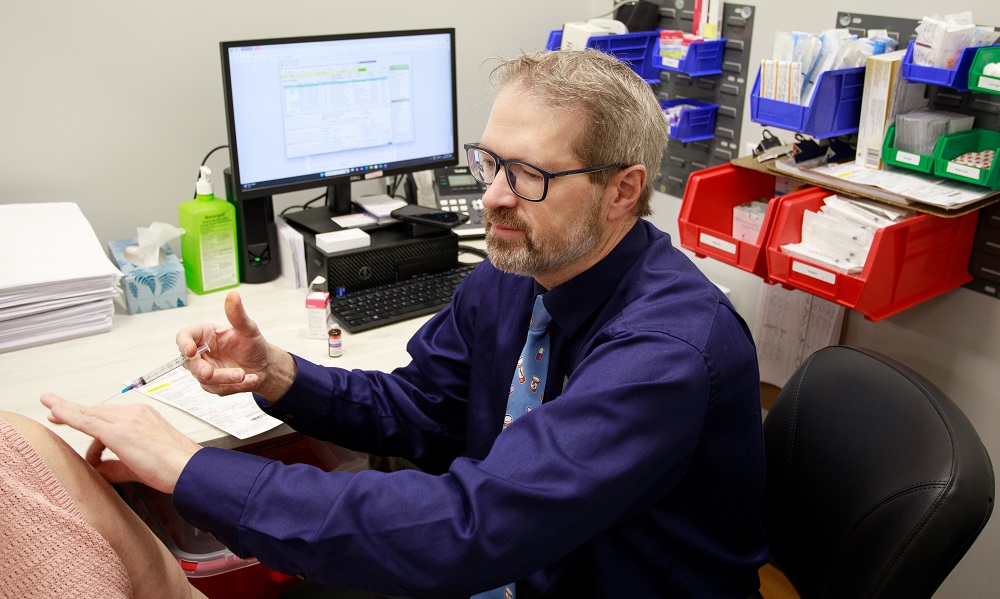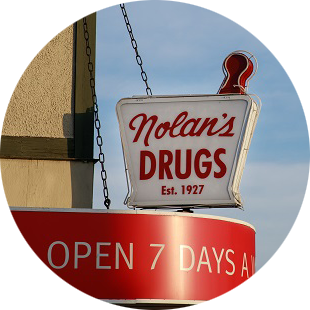Back in pharmacy school, Sam Nolan had always felt inspired by the University of British Columbia Pharmacists Clinic. Here was a pharmacy space where no dispensing services are performed. Instead, patients are given the opportunity to see a pharmacist — or pharmacy student — for clinical services such as medication management, vaccines, or just a general consultation about a health concern or query.
When it was time for the fourth-generation pharmacist to take over a portion of the family business, he began looking for opportunities to try and create a similar consultative space within the pharmacy, separate from the dispensing area.
The 2014 graduate and his team had a vision and began planning for two consultation rooms in their largest pharmacy, Nolan’s Pharmasave in downtown Vernon. This meant private rooms with access to computer records, supplies for clinical services, furniture for the pharmacist and patients, a phone for connecting with physicians and other care providers, and anything else the consulting pharmacist might need.
After careful thought, business modifications and construction, the rooms were ready. At first, the rooms weren’t staffed, and the space functioned much like consultative spaces at most pharmacies. They were used whenever the pharmacist and patient needed a private space, as a location for injections, medication reviews; its use was up to the pharmacist at the dispensary counter, for when they needed to sit down with a patient.

Nolan's Pharmasave has a separate non-dispensing space featuring a waiting area and two consultation rooms.
It helped that the regular intake pharmacist at Nolan’s had a passion for clinical work.
“Our intake pharmacist, Rod Schafer, took advantage of every opportunity to help patients. His rapport-building was phenomenal. I would go so far as to say, within the scope of practice, that he never turns anyone away,” Nolan said. “Even for services where we weren’t being reimbursed. For example, to administer someone’s first dose of Ozempic, or to guide them on how to use a smartphone that connects with their glucose sensor for patients with diabetes — it’s part of the service we do. I believe that this level of kindness and service helps drive business to our pharmacy, and helps spread by word of mouth that patients can come to us for anything.”
When the COVID-19 pandemic came, the opportunity for a designated non-dispensing pharmacist presented itself. Suddenly, multiple physicians in his community closed. Some retired. Some moved away. Others decided not to practice for other reasons. Hundreds of patients became unattached. All the walk-in offices shut down. It was a real opportunity to properly utilize the two consultation rooms.
The pharmacy began seeing many more appointments, not just for vaccines, but for all manner of consultations for patients who needed to speak with a health professional. With the development of the provincial framework for pharmacist medication administration and minor ailments prescribing, they were able to provide medical services to any patients in need, relieve pressure on other prescribers in Vernon, and be reimbursed while doing it.

Each consultation room is equipped with everything needed for a pharmacist to provide clinical services.
“When we got access to CareConnect, that was a game-changer to have access to medical data that we didn’t have before. We made sure all our pharmacists had access to it, and with CareConnect, we could now do full vaccine profile reviews with patients to identify any gaps in their immunization status,” Nolan recalled, referring to B.C.’s electronic health record system, introduced to pharmacists during the pandemic.
“Patients started noticing we were different. They would tell their friends that we have private rooms, we have a waiting area, and our pharmacists go above and beyond to help patients identify ways to keep them healthy. One person shares their story, and then another, and it just sort of snowballed.”
As of January 2025, Nolan’s Pharmacy often starts its day with more than a dozen clinical appointments already booked for its consultation spaces — enough to afford placing a full-time, non-dispensing pharmacist in the role.
“We never turn away a walk-in. A patient arriving at the dispensary intake seeking a same-day vaccine would be asked to sit in the waiting area for our clinical space. As soon as our pharmacist is free, they would speak with them right away,” he said.

Rod Schafer serves as the full time non-dispensing pharmacist.
The work has made waves among other health providers in the community, including at the city’s Urgent Primary Care Centre, located about two blocks away from Nolan’s, from where patients frequently show up seeking a minor ailment consult.
“In this instance, they said, ‘Listen, we want a pharmacy to refer to in downtown that’s open late, can we refer people to you who have minor ailments?’ It just worked itself out,” Nolan said.
Nolan’s walk-in service also spawned a relationship with the local mental health team. Through the collaboration, Nolan’s non-dispensing pharmacist now offers finger prick complete blood count testing for patients on clozapine, which is much more patient friendly than chronic intravenous blood draws. They have found these appointments have helped strengthen relationships with their mental health patients.
Eventually, with enough demand, the team at Nolan’s plan to employ a second full-time pharmacist in the clinical service space. Currently, the second of the two consultation rooms is only used during peak demand by pharmacists temporarily staffing the post. And they anticipate that demand will likely come. With recent population growth in the city, Nolan’s has just completed a renovation to double the regular dispensary floor space to keep up with the growing prescription count.
“I would like to one day have a team of three or four non-dispensing pharmacists who rotate their days in our non-dispensing consultation rooms, each booking appointments, doing administrations, reviews, minor ailments, and just providing good medical service for whoever is out there needing it,” Nolan said.
“I hope one day, pharmacy practices like this will become the standard in our business. We now have all these extra skills and frameworks that we can practice within. We have a deficit of prescribers in B.C. It’s a no brainer for someone who has the space and the passion to do this.”
 Nolan’s Pharmasave has remained a locally owned independent pharmacy since 1927. Their three locations are currently owned by William Beley (second-generation owner), Susan Carrie (second-generation owner), Dana Fraser, Ian Johnstone, Alex Nolan (fourth-generation owner) and Sam Nolan (fourth-generation owner). Deeply rooted in the Vernon community, the pharmacy has continuously evolved to meet the growing health care needs of its patients. With a commitment to patient-centered care, Nolan’s has expanded beyond traditional dispensing, integrating clinical services to provide a more comprehensive health care experience. One of their most significant advancements has been the creation of dedicated consultation spaces — an initiative that has transformed how they serve their community.
Nolan’s Pharmasave has remained a locally owned independent pharmacy since 1927. Their three locations are currently owned by William Beley (second-generation owner), Susan Carrie (second-generation owner), Dana Fraser, Ian Johnstone, Alex Nolan (fourth-generation owner) and Sam Nolan (fourth-generation owner). Deeply rooted in the Vernon community, the pharmacy has continuously evolved to meet the growing health care needs of its patients. With a commitment to patient-centered care, Nolan’s has expanded beyond traditional dispensing, integrating clinical services to provide a more comprehensive health care experience. One of their most significant advancements has been the creation of dedicated consultation spaces — an initiative that has transformed how they serve their community.
